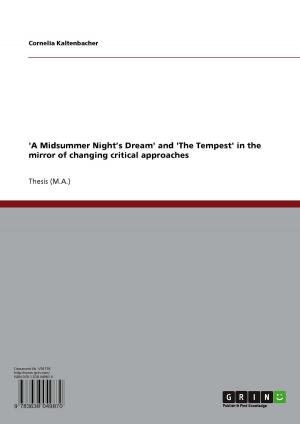William Shakespeare: an analysis of Macbeth's character
Fiction & Literature, Literary Theory & Criticism, British| Author: | Alessandro De Vivo | ISBN: | 9783638720694 |
| Publisher: | GRIN Publishing | Publication: | April 27, 2007 |
| Imprint: | GRIN Publishing | Language: | English |
| Author: | Alessandro De Vivo |
| ISBN: | 9783638720694 |
| Publisher: | GRIN Publishing |
| Publication: | April 27, 2007 |
| Imprint: | GRIN Publishing |
| Language: | English |
Seminar paper from the year 2002 in the subject English Language and Literature Studies - Literature, grade: 2.0, University of Education Ludwigsburg, 5 entries in the bibliography, language: English, abstract: I would like to base my essay on the protagonist Macbeth. Probably composed in late 1606 or early 1607, Macbeth is the last of Shakespeare's tragedies, the others being Hamlet, King Lear and Othello. If Hamlet is the grandest of Shakespeare's plays, Macbeth is from a tragic standpoint the most sublime and the most impressive as an active play. If we just consider the plot, Macbeth is a relatively simple play. In fact like Richard III and numerous pre-Shakespearean plays, it deals with a traditional form: the rise and fall of a great man. In the first part of the play we read about Macbeth's rise to power; then he manages to become king of Scotland. From this moment on he begins with a period of tyranny that will end with Macbeth's death and the accession to the throne of the legitimate king. For this reason he can be considered as the epitome of a tragic hero. In the course of the play we notice a great development of Macbeth's character. At the beginning he is a man much honoured by his countrymen for his leading and courageous part in defence of his good king and native land. During many conflicts he showed his great courage and he continues showing this personal quality also when he becomes king and he has to take a lot of difficult decisions. But this first description about Macbeth's character is not the definitive one: in fact as soon as we meet him, we find out also his negative qualities, for example that he is both ambitious and murderous. It happens when the two Scottish generals, Macbeth and his friend Banquo, returning victorious from the great battle against a rebel army assisted by the troops of Norway, meet three witches in the middle of the road. They begin to speak to Macbeth: the first of them greets him with the title of Thane of Glaning (so it is in the reality); the second follows by giving him the title of Thane of Cawdor, to which honour he has no pretensions; the third predicts that Macbeth will be king of Scotland. Then turning to Banquo, they prophesy that his son will be king of Scotland. So they turn into the air and vanish. After a while Macbeth and his friend are stopped by some messengers of the king, who are empowered by him to confer upon Macbeth the dignity of Thane of Cawdor: an event so miraculously corresponding with the predictions of the witches astonishes Macbeth, who begins to think about the other and more important prophecy...
Seminar paper from the year 2002 in the subject English Language and Literature Studies - Literature, grade: 2.0, University of Education Ludwigsburg, 5 entries in the bibliography, language: English, abstract: I would like to base my essay on the protagonist Macbeth. Probably composed in late 1606 or early 1607, Macbeth is the last of Shakespeare's tragedies, the others being Hamlet, King Lear and Othello. If Hamlet is the grandest of Shakespeare's plays, Macbeth is from a tragic standpoint the most sublime and the most impressive as an active play. If we just consider the plot, Macbeth is a relatively simple play. In fact like Richard III and numerous pre-Shakespearean plays, it deals with a traditional form: the rise and fall of a great man. In the first part of the play we read about Macbeth's rise to power; then he manages to become king of Scotland. From this moment on he begins with a period of tyranny that will end with Macbeth's death and the accession to the throne of the legitimate king. For this reason he can be considered as the epitome of a tragic hero. In the course of the play we notice a great development of Macbeth's character. At the beginning he is a man much honoured by his countrymen for his leading and courageous part in defence of his good king and native land. During many conflicts he showed his great courage and he continues showing this personal quality also when he becomes king and he has to take a lot of difficult decisions. But this first description about Macbeth's character is not the definitive one: in fact as soon as we meet him, we find out also his negative qualities, for example that he is both ambitious and murderous. It happens when the two Scottish generals, Macbeth and his friend Banquo, returning victorious from the great battle against a rebel army assisted by the troops of Norway, meet three witches in the middle of the road. They begin to speak to Macbeth: the first of them greets him with the title of Thane of Glaning (so it is in the reality); the second follows by giving him the title of Thane of Cawdor, to which honour he has no pretensions; the third predicts that Macbeth will be king of Scotland. Then turning to Banquo, they prophesy that his son will be king of Scotland. So they turn into the air and vanish. After a while Macbeth and his friend are stopped by some messengers of the king, who are empowered by him to confer upon Macbeth the dignity of Thane of Cawdor: an event so miraculously corresponding with the predictions of the witches astonishes Macbeth, who begins to think about the other and more important prophecy...















